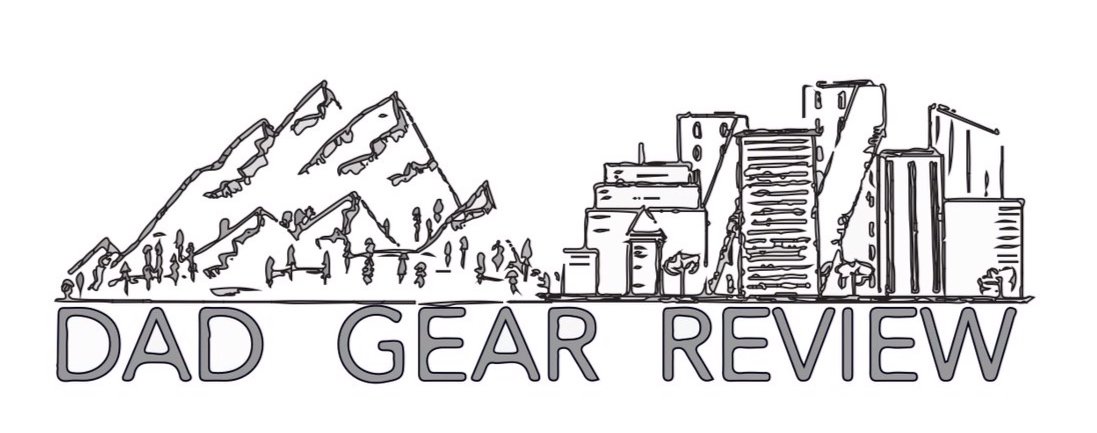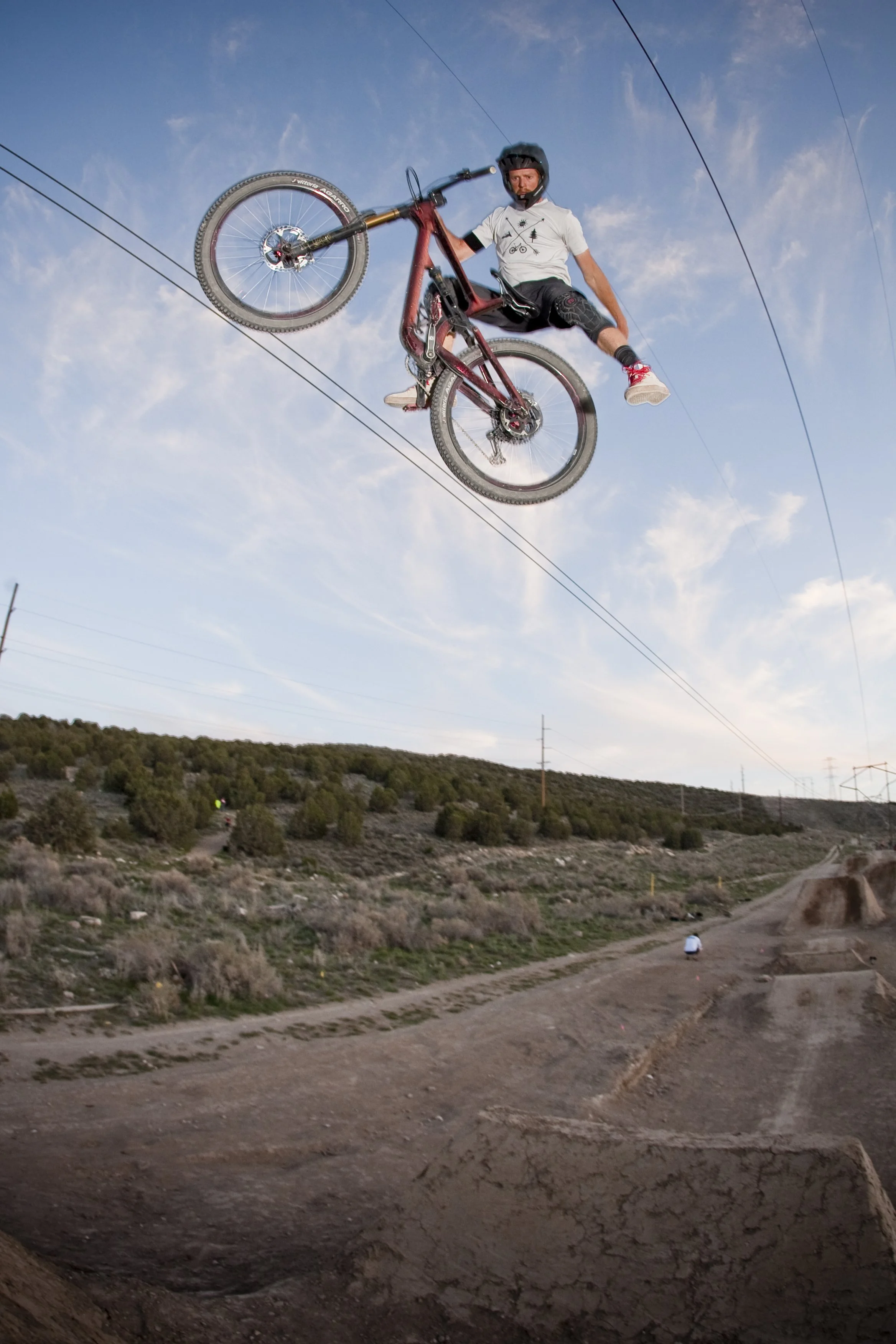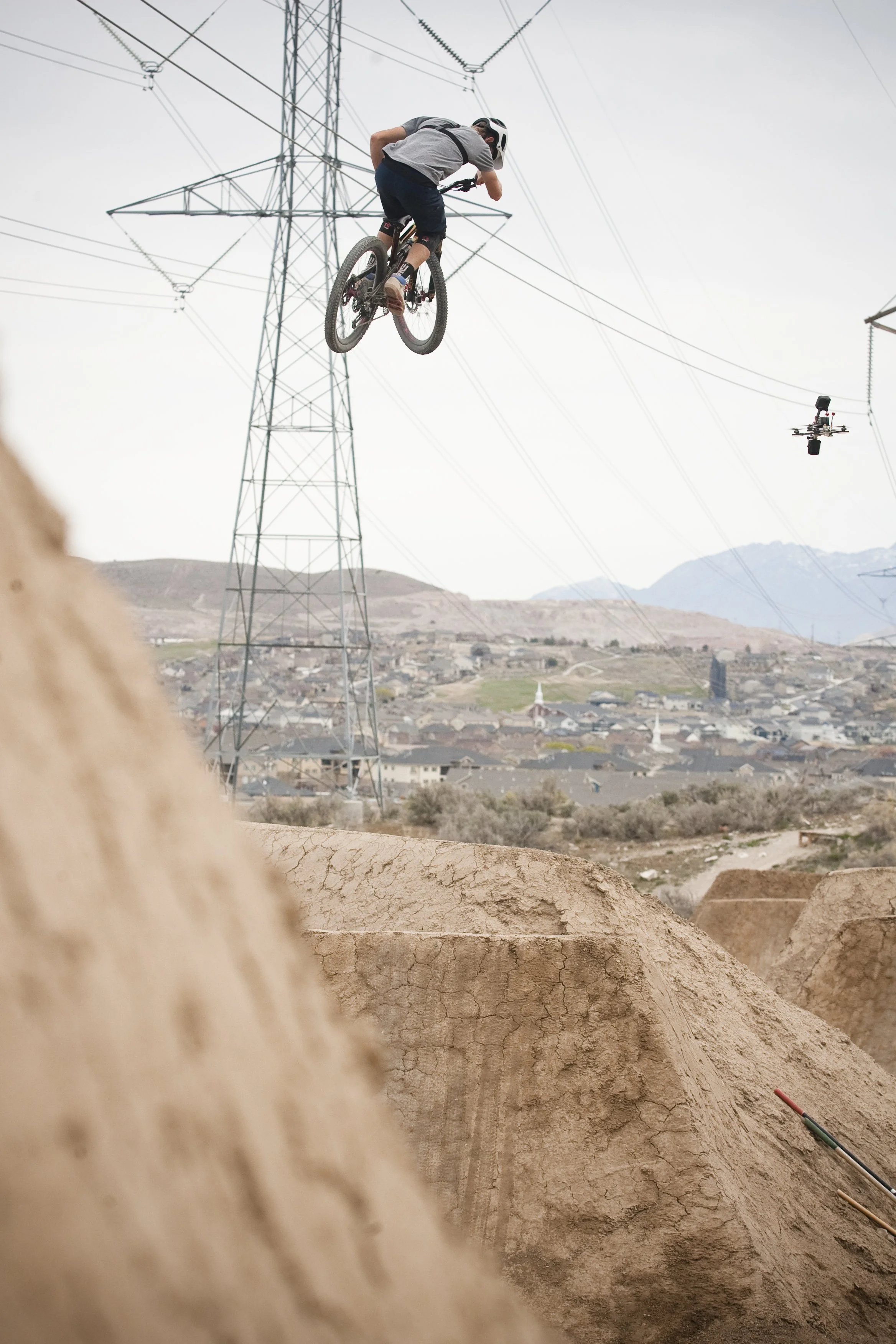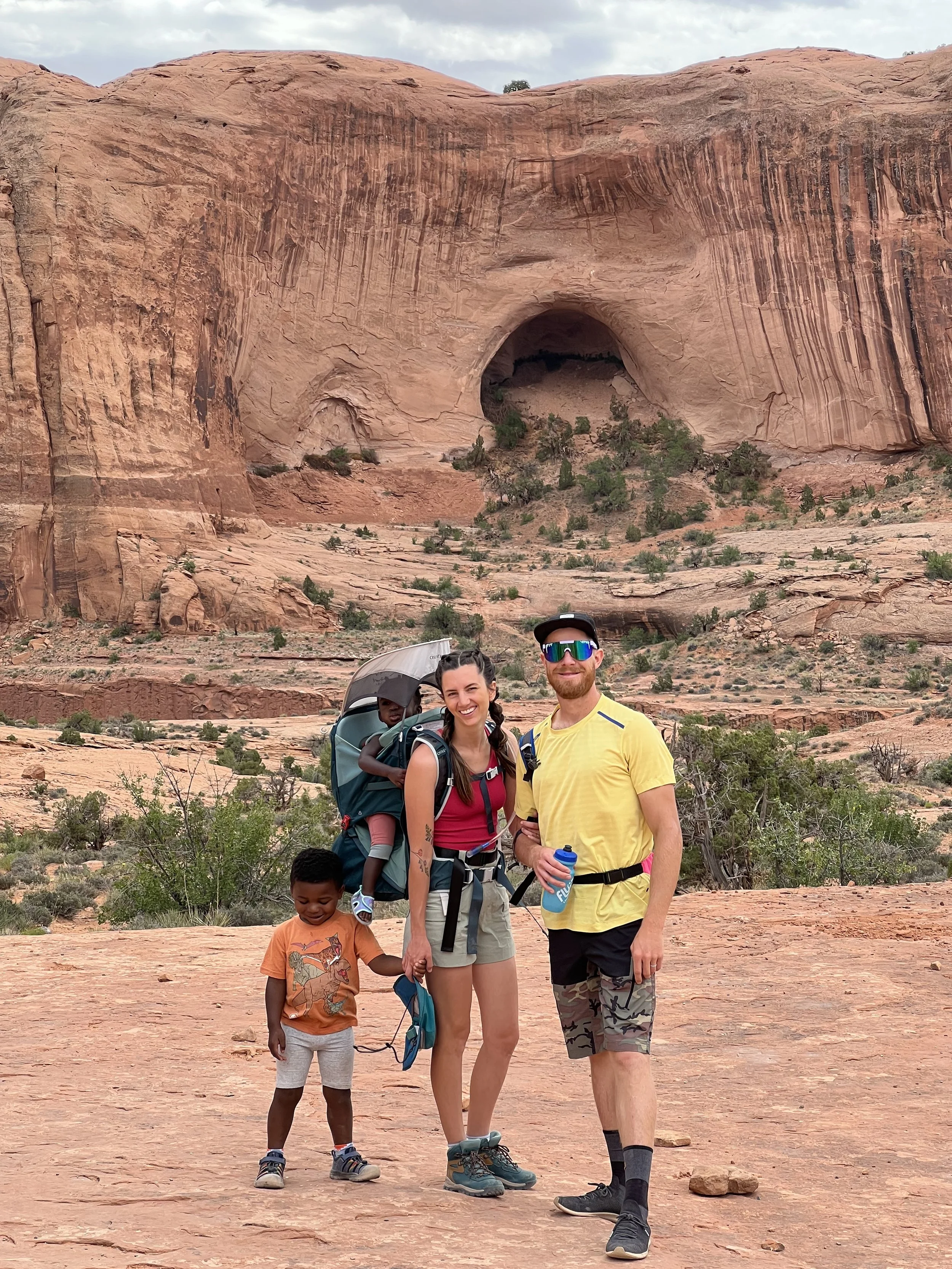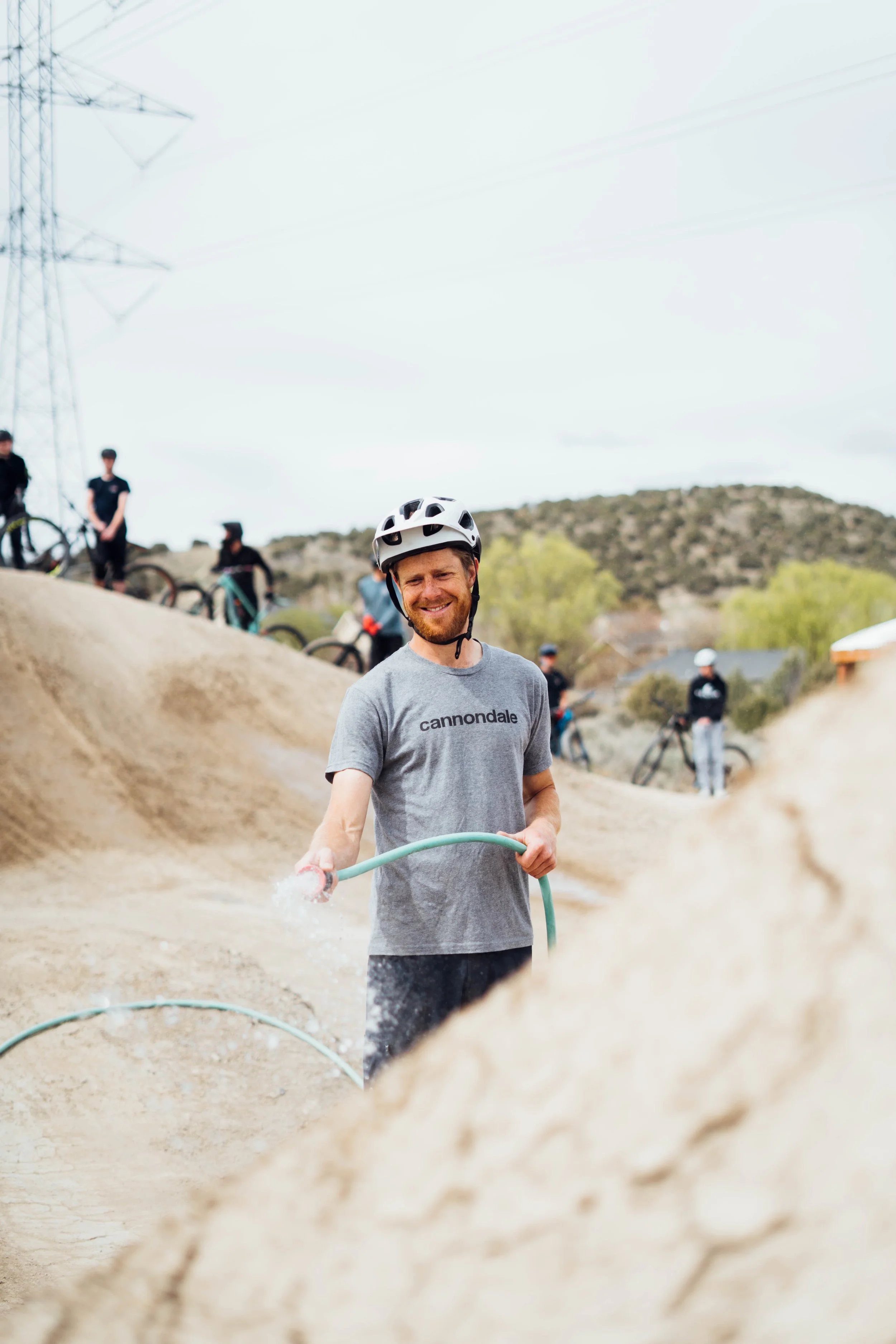
“To spend time with these tiny kids who are just finding the joy of biking for the first time or are just discovering pieces of nature for the first time… being able to be there and see that excitement in their eyes is really fun.”
- Christian Peper
Professional Cyclist, General Outdoorsman, Dad, and Social Media Powerhouse Christian Peper Talks Biking, Parenting, Good Grades, and
Mountain Bike Safety for Kids
By Steven John
Christian Peper grew up riding bikes. He was one of those kids who was on a bike before preschool and has pretty much never gotten out of the saddle since. Proverbially, that is, because he has in fact spent a lot of time not riding bikes, such as time spent crushing it in school, developing a professional life, and raising the two kids he and his wife adopted.
You probably know Christian from his formidable social media presence, but in fact his online cyclist dad fame was never an intention: he’s one of those few online media personalities (note the studious avoidance of the word “influencer,” because he is primarily interested in being a positive influence for his family) who caught on, so to speak, because he’s just a magnetic guy.
That… and he lands all sorts of sick jumps on his bike. Not when he has a kid strapped on for the ride, though – they’ll have to experience air for themselves when they’re ready.
When we caught up with Christian for a recent Dad Gear Review conversation, we had already seen plenty of his two-wheeled antics and pictures and videos of his adorable kids, but what we wanted to know first was where it all started.
How did you get into biking, and specifically high-level mountain biking?
“I was four years old when my dad started taking me to the BMX racetrack as a kid,” Christian said. “So, I had a little 16-inch Walmart bike prior to that, and I think I was riding on two wheels at three, but my dad – I don't really know what it was – he was into road biking when he was in college. He never really got into BMX or mountain biking or anything, but for some reason or other, he decided we were going to go to the BMX track when I was four. And so I started racing there on super skinny tire bikes and I did that for a number of years with him and that was really my introduction to the sport.”
Got that? On two wheels, sans training wheels, not long after the age most kids are getting out of daytime diapers. Thus it does make some sense why this guy now spends a good amount of his life upside down flying through the air on a bike.
OK, very cool – obviously you've been doing this your whole life, basically. So, what has biking meant to you personally? And professionally? Do you see it as the thing that primarily defines you as a person, given all that time, or as just a part?
“Yeah, I would say it's a 50/50 chunk of who I am,” Christian answered. Then he paused, thinking, before continuing with: “For some people probably it's a lot more, but for me, I feel like I've tried to keep this balance during my life where I really paid attention in school, I really took my college education seriously, and the same [with] a lot of stuff in the professional sphere and personal development. Biking has always been there as this hobby that added balance to my life that let me get my stress out and just have a really healthy outlet to socialize and to be creative.”
“And that's really what it was for the first 25, maybe 27 years of my life, and it hasn't been until the last few years that I've started to take it a little bit more seriously, particularly on social media, and that it has blossomed into more. It's now part of how I make a living and it's part of how I connect with a much wider audience. I get to share fun experiences with people around the globe. So, it's become more now, but there's still a huge element of me that's focused on professional life and family life and other things.”
Given that family life is Christian’s life as of the past few years – he has a son who is three and a daughter who is one – we focused on that next.
Photo credit: @shadrack311
How has fatherhood changed your life, both in terms of biking and being outdoors and adventuring, and just in general?
“So, I really loved my relationship with my father growing up,” Christian said. “And so I'd always looked forward to being a dad myself. In some ways it's just the realization of that dream; to have a similar relationship with my kids. Obviously, it definitely changes things, like the amount of free time that I have to dedicate to stuff has gone down because I have more responsibilities, but the responsibilities are fun. They are fulfilling, and getting to spend time with my kids, camping or riding bikes, is a really fun lens to see life through. To spend time with these tiny kids who are just finding the joy of biking for the first time or are just discovering pieces of nature for the first time and being able to be there and see that excitement in their eyes is really fun.”
Why is it important to get kids outdoors and having adventures?
“I think this generation of children – and with every generation of children – is becoming more and more exposed to the digital world, and there's a severe pull on their attention in that direction. And I think that that balance that I've strived to have in my own life is going to be increasingly important [in order] for kids to be healthy socially, mentally, and physically. And so, playing outdoors is going to play a big role in maintaining balance. I think it's really important to have outside time.”
“I mean, you can look at the research for kids too,” Christian Peper goes on, “and free play and outdoor play are huge in children for development and being independent. And I think that that's really important. You may have heard of the “1000 Hours Outside Project” challenge, where they essentially challenge parents to let their kids play outside for 1000 hours during the year. My wife has been an absolute rockstar at getting the kids outside on a day-to-day basis, and going solo backpacking with BOTH kids at times as they pursue that 1000 hours. I don't know how close we got – I know we were, I think 60%-plus, but it takes serious commitment and dedication, but I think it will pay off.”
We are 100% about outdoor play at DGR, of course, and consider ourselves pretty well-versed there. But we’re not cycling experts, so we veered back into the topic of two wheels with the expert we had.
What are the main differences between mountain biking, and off-road biking in general, and the regular type of biking on suburban streets and sidewalks that most kids are used to?
“I think it's much safer to be off-road, even though the terrain is varied,” Christian says. “People think of the terrain as being more dangerous, and it can be, but I think of the cars as part of the terrain on the streets. And, man, I would much rather come into contact with a tree than with a car, and so I think, from a kid's perspective, it's going to be much safer to be off-road and to be on the trails. And with that comes the challenge of bumpier terrain and so you just have to approach it a little bit differently with your gear, whether you're running suspension or larger tires that are running at a lower pressure, something to add comfort to your ride so that it's not so jarring to be bouncing around on the rocks and gravel.”
What are the safety concerns parents should watch out for when it comes to kids and mountain biking?
“It's less likely that kids under the driving age are going to spend time on legitimate trail systems. It's more likely that they are going to go to a neighborhood park, be it a bike park or a skate park or something to that effect. And so communities being willing to invest in well-made bike parks, and not just podunk spots that kids are digging in the backyard, is very important.... When I was a kid, I remember we were jumping over rusty old steel drums and sketchy stuff like that, and I think that if parents want their kids to be safe, then being an advocate in your community to have the city build a safe bike park is key. One where the features are well kept and wide enough and big enough to be smooth, versus these tiny little sketchy bike parks that, even though they're only two or three feet tall, could actually be more dangerous because they're not shaped correctly.”
What is some necessary mountain biking gear for kids?
I think it's important to just keep it pretty basic for kids. I would say a helmet is number one, and gloves are like a secondary. I am using the little POCito helmets from POC. They're awesome, really good adjustability. They have MIPS in kids' helmets, and I can appreciate head protection more than any other type of protection. Gloves are good because kids are going to crash and they're going to skin their hands and that hurts. I've done it way too many times, so having gloves on is a good secondary protection for them.
And do you think elbow pads and knee pads are needed, or at some point, is it like you've got your helmet, you have your hands covered, you've got the basics and you’re good?
“I didn't start worrying about knee pads and elbow pads until I was probably closer to 16. When your body starts to hit the curve, like: ‘OK I still heal like a 12-year-old, but I'm starting to get a little bit older and now it's time to start taking care of my joints a little bit more carefully.’ And so, I'm very religious about wearing my knee pads now and I have been for years because I want to protect those joints and that's the heaviest impact joint for me. I'll usually wear knee pads and if I feel like I'm going to get really aggressive, I'll put hip pads on, like a padded compression short, but those are the two that I personally use. And honestly, for kids, unless they're really pushing themselves and trying to progress and crashing regularly, I probably won't push my kids to wear knee pads and elbow pads until they're trying to learn tricks or new jumps.”
Photo Credit @shadrack311
How do you pick the right mountain bike for a kid based on size, based on the terrain they'll be facing, based on their skill, based on activity? What are the factors that parents need to consider when they're getting the best mountain bike for their kids?
“Kids' bikes have historically been challenging. When I was a kid, I got my first 18-inch freestyle bike and it was heavy. It had the parts that it needed to have to look like a real BMX bike, and there's mountain bikes that are the same thing, but they're heavy. And I really think that kids need to learn what it feels like to let the bike move independently beneath them to start to develop bike control. So, I would say pick as bare bones of a bike, one that was designed to be as lightweight as possible, because that's really where kids are going to learn and develop bike control. They probably don't need a full stack of gears. If they can get a few gears without being too much of a weight expense, awesome. They probably don't need a front brake, they're not going to be riding aggressive enough stuff that they're going to need a front brake, unless that's the specific discipline that you're going for.”
“Now, a kid [says] ‘I want to be a downhill rider,’ then yeah you're going to get a heavier bike that maybe has a single speed gear, two brakes, really thick tires with big knobs. But it's going to depend on the type of riding that they want to do. If you're wanting to be more of a trail rider or a jumper or a BMXer, I'd go with something lightweight and minimalist. If you're wanting to be something else, like a downhiller, then you can start to add more of the weight expense to get some of the gearing that you need. You need to learn how to use a front brake effectively as a kid to really develop that skill down the line and so that's a weight expense that you'd be willing to take.”
What are some of the best ways to introduce kids to mountain biking?
“I honestly don't have a ton of experience to speak from because my oldest is still only three, but the biggest thing that I've seen with him is just making it fun. When kids feel like there's pressure on them, or they're expected to do something, psychology really says that they don't want to do it. But kids feel drawn to it naturally because it's enjoyable, and that is the number one priority for me.”
“With my kid, it has been a combination of the Mac Ride. We love that child bike seat because he can ride up on my top tube, and he just laughs his head off, loves that thing. And also his little push bike that we got from Cannondale. And me pushing him around on that and shuttling him around on my bike has been enjoyable enough for him that now he's naturally interested in learning how to ride his own little bike by himself and getting better at that.”
“Besides that, I feel like just having fun for the first while is the most important thing, and then when they develop a natural interest in it themselves, that's when you can start to push for some of the more parental agendas, which is like: ‘Let's become more disciplined in taking this seriously so that you can improve and progress.’ And I just feel like that needs to be secondary after the kid learns to love it.”
What are some common mistakes novice mountain bikers make?
“I think that riders tend to be very afraid of the front of the bike. They like to have their weight back, and I really think that people will benefit from becoming friendlier with the front of the bike. Being able to have your weight over both tires equally means that both tires have the same amount of traction because of the weight that's pushing the knobs into the ground, and that helps out a lot with steering and with your body position for jumping and being able to manipulate the bike over the terrain that you're riding. You don't want to be too far over the front obviously, but learning how to be friendlier with the front of the bike is huge.
Generally speaking, what are some of the benefits of mountain biking?
“Well, for me socially, all of my closest friends who I have had for, some of them I've had for 18 to 20 years, which I'm only 30 years old, so more than 50% of my life, have come from biking. And it's really nice because I have friends who I can just talk smack with and have a good time and we don't have to worry about anything in particular, and it's just for blowing off stress. And then I have friends who are mentors to me, who also ride that are helping me professionally, or are helping me with relationships with other things like that, who I also met through riding. There's a full gamut of people who maybe are just friends to just have fun with, and maybe who are friends for a deeper purpose, but we all have been riding together for so long that it's made these really close relationships, that's from the social perspective.”
“From the mental perspective, I think riding has played a huge part in just adding balance to my life, like I said earlier. Going to school and focusing really hard, I had a 4.0 GPA through the entirety of high school, and balancing that nerd life, where I was so dedicated to my studies, with this riding life, where I could blow off the steam and be creative and have fun, was huge in not burning out, if that makes sense.”
“And then last one I'd say is physically it's just been so good for me because I've stayed pretty much the same body shape since I was in high school because I spend enough time doing cardio activity and strength building activity, just because of this hobby that I love, that it's just contributed to my health. There's also the drawback of injuries; if you're pushing yourself, you're probably going to fall and get injured. And so if you can just be careful about that and wear the pads, wear the helmet, I think that it's worth the trade off.
What are some ways people can approximate the mountain biking sport in an area without significant elevation or real mountain biking terrain?
“I would say more and more NICA teams are cropping up around the United States, and not everybody has mountainous terrain to practice on. And those groups are getting scrappy with backyard setups or community bike parks. And one of the most fun products that I found over the last year was a company called Yardi MTB. They make backyard bike park features like skinnies and teeter totters and ramps and rollers. And when I first found it, I was like: ‘OK, this is pretty entry level. Like someone's going to ride over a roller and they're going to go off an 18-inch drop in their grass.’ But as I started to play with these features, and you can see it on my Instagram, you can see it on Yardi's Instagram. You can build some pretty ridiculously challenging courses by putting these features back to back to back in random order – there's nothing that I have ridden that is closer to some of the technical, chunky, challenging terrain like, Sedona or Moab, than these little features.”
“And you can have so much fun for hours and hours just changing the order and flipping them around and, in my mind, that is such a good skills-building activity because it's so focused on the technical aspect that a lot of riders don't really develop because they're more interested in putting the miles in. And I think putting the time in with the technical riding is going to do wonders for your riding. And that's something that you can do in the suburban community. All you need is a flat patch of grass where you can set these up and if you fall over, you land in the grass, you're not going to break your hip on a rock.”
What are some of your can't-live-without gear for biking that you use and that you use with your kids, and that your kids use?
“Yeah, the Mac Ride is number one. We love the Mac Ride, and we use it regularly. It's so nice to be able to go trail riding without a babysitter and to just take your little kid right there on the top tube with you. And you find some really funny conversations will ensue because kids are chatterboxes, and they're seeing all this new nature around them. And they’re just talking because they're up in the cockpit versus being in a trailer behind the bike where they're maybe getting dust in their face from your back tire, or they're looking at just the back end of your bike the whole time. I think the cockpit is much more engaging for them.”
“We do have a bike trailer, we have a Burley bike trailer that we love for just riding around the city on the sidewalks or the roads. And that's really nice for my wife because she can put both of our kids in it. They can take a nap or hang out or eat snacks and my wife can get in exercise or go places that she needs to, or just take the kids to the park without having to load up the car.”
Finally, what is some advice you have generally for moms and dads who want to have more fun outdoors with their kids?
“I would say come prepared,” Christian says, before echoing the advice every outdoor-loving parent we have talked to shared as well: “Kids are going to get hungry outside. They're going to get cranky and so if you can come prepared with a space for them to sleep, if they need a nap during the day, that's comfortable, and if you can come prepared with snacks and all of these goods. Those are the main things that kids need to just not be thinking about themselves and to rather think about nature and having a fun time. And so, just making sure that you're well prepared with those basic needs is huge. And sometimes in the winter it’s warmth, make sure that your kids' hands aren't getting cold when you're on a bike ride or outside. Having gloves that are sufficiently thick, or a good hat or jacket, or thermal wool layers underneath. Those are great.”
With kids that are properly warm or cool and plenty well fed, adventure awaits, be it on two wheels, on two legs, on the water, over the snow, and on it goes.
Photo Credit @tim.dacosta
